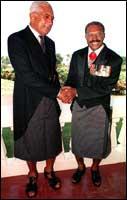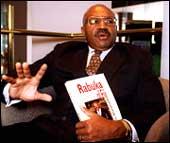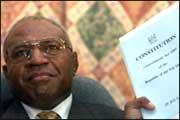In 1987, the Fiji Golf Club in Suva was a piece of Paradise. Its vast expanse of greenery, dotted with coconut palms, fruit trees and flowers, was breathtaking in the morning, just before the scorching tropical sun made its appearance.
To be on the golf course at daybreak was sheer joy. But very few people took advantage of this ideal setting. Since security was of no concern then, I enjoyed my morning excursions alone, chasing the white ball. To inspire me when I did not play well were the words written at the entrance to the club: 'Golf is a bit like sex; you don't have to be good at it to enjoy it.'
Occasionally, I saw another figure ahead or behind me, hitting long balls, though not always in the straight direction. Our paths rarely crossed and both of us seemed to enjoy our solitude in the silence of the morning. But one day one of his golf balls swerved and came dangerously close to me and I paused to wait for him to join me and introduced myself. He obviously knew who I was and told me that he, Colonel Sitiveni Rabuka, had recently returned to Fiji from a UN Peacekeeping force in Sinai as the third ranking officer of the Fiji army.
Even more interestingly, he had recently done his Staff College in Wellington near Ooty. I said to myself that I had met the perfect contact and suggested that we play together and he readily agreed. From then on, we played together whenever we found ourselves on the course at the same time.
Steve Rabuka (pronounced 'rambuka') was not particularly talkative, but he was friendly and played fairly good golf. He often reminisced about his days in India and the warm hospitality of the Indian Army. Having made his acquaintance, I decided to invite him to a dinner in honour of my visiting military attaché from Canberra, Colonel J P Singh.
He surprised me by quickly declining the invitation, though his boss Nailatikavu, the son-in-law of Prime Minister Ratu Mara readily accepted. In fact, Rabuka mysteriously turned down every invitation to visit the India House, though we continued our meetings on the golf course.
 Image to the right: Fijian President Ratu Sir Kamisese Mara (left) and Major General Sitiveni Ligamamada Rabuka shake hands in Suva after Rabuka was sworn in as prime minister.
Image to the right: Fijian President Ratu Sir Kamisese Mara (left) and Major General Sitiveni Ligamamada Rabuka shake hands in Suva after Rabuka was sworn in as prime minister.
When the shocking news of the military coup in Fiji came on the morning of May 14, 1987, I could not believe that it was my friend, Steve, who walked into the parliament, arrested Prime Minister Bavadra (pronounced 'bavandra') and the entire cabinet and drove them off in military trucks.
Within hours, I received a call from the office of the new military ruler that he would receive all the high commissioners and ambassadors the same afternoon. We dutifully went to see him though the high commissioners of Australia and New Zealand stayed away under instructions from their capitals.
I had no way of contacting Delhi as our only communication links, the telex and the telephones were disconnected before the coup. My own judgment was that I should go as the fate of several Fiji Indian parliamentarians and half the population of Fiji, which was Indian, was at stake.
At the meeting, which was stiff and formal, neither Rabuka nor I showed any familiarity with each other. At the end of his presentation, justifying the coup, I was the only one who spoke. I said I was concerned about the lives and properties of Indians and that I was unable to convey what he said to my government as the phones had been snapped.
Rabuka was equally matter-of-fact. He assured me there was no reason for any concern about the Indians as they were Fiji citizens and that I would have my phone restored by the time I returned to my office.
Since then, we have not spoken to each other even once, even though we were important players in the drama that unfolded for the next two years till he ordered me out and closed our mission.
Rabuka is the only coup leader in world history who not only told his story in a book (seen here, left, in Auckland, New Zealand to promote his book), but also acted as himself in a film on the coup. He was also quite liberal in giving interviews to explain his actions at every stage. But the person, who emerges from this wealth of material, is a confused man, full of contradictions about his life, beliefs and actions.
(seen here, left, in Auckland, New Zealand to promote his book), but also acted as himself in a film on the coup. He was also quite liberal in giving interviews to explain his actions at every stage. But the person, who emerges from this wealth of material, is a confused man, full of contradictions about his life, beliefs and actions.
There was never any doubt that he was a mere instrument in the hands of his feudal masters, who could not bear to lose their political power to the new compact between the educated Fijians and the Fiji Indians, which defeated the Fijian oligarchy in the elections. In his bid to prove that he was his own man, he kept spinning tales about himself, without being a good spin master.
Rabuka's main thesis was that he overthrew the Bavadra government as foreigners dominated it. Indians were honoured guests in Fiji, but they had no business to rule the Fijian homeland. Moreover, the continuation of the Bavadra government would have led to bloodshed and chaos.
It was of no concern to him that Fiji Indians had no home other than Fiji and that they were citizens of Fiji for several generations. He claimed to be a genuine Christian, who went to the extent of decreeing that strict Sabbath should be observed on Sundays, but he had no qualms in denying fundamental human rights to Fiji Indians.
He appeared to challenge the feudal set up, but he brought the feudal lords into his military government. His Christian values did not deter him from announcing that he had fathered two daughters outside wedlock. He stressed Fijian nationalism to spite the Indians, but he had no problem in accepting the dominance of Australia and New Zealand. He said the Indians should owe their allegiance to India, but declared that the Indian high commission had no role to play in Fiji. He contradicted himself every time he opened his mouth, but he was not embarrassed even when the blatant contradictions were highlighted by the media.
The second military coup he staged soon after the concerned political parties struck a deal with his consent and knowledge was also a big contradiction. He said he had no wish to remain in power, but as soon as he realised that the politicians had abandoned him, he staged a second coup and announced a new government without any provocation. His concern for his people did not extend to the need for unhindered economic development. Fiji lost its value as a tourist and investment destination and came to the brink of bankruptcy.
By the time he came round to re-establishing democracy after ten years, Fiji had lost much of its advantage over the other Pacific Island states, which it had gained on account of the dedication and hard work of Fiji Indians. He repeatedly proclaimed his allegiance to the British queen, but declared Fiji a Republic to escape the guidelines of the Commonwealth on democracy and racial harmony. The ultimate contradiction was that he joined an alliance with the same Fiji Indian leaders he had incarcerated.
It remains unclear whether Rabuka's time in India at the Staff College had a role to play in his anti-Fiji Indian feeling. My research on his days in India revealed that his Indian supervisors had failed to grasp his complex personality. They rated him as an outstanding officer and even characterised him as a broad-minded, fair and sociable person, none of which was found justifiable by his later actions.
In fact, the wife of an army officer, who did the Staff College course with Rabuka, wrote that the Fiji Indians should be held responsible for turning the ebullient and friendly 'Steve' she knew into a coup leader and dictator! No one took notice that he spent his time in the Staff College specialising in military coups in developing countries.
Many years later, Rabuka proved his loyalty to his alma mater by requesting the Government of India for a gown similar to the one he wore at his graduation in Wellington. Since he had aligned himself with the Indians by then, India overlooked his past sins and obliged.
 As the man who initiated the coup culture in the South Pacific, he helplessly watched another coup in Fiji later (Left: May 2000: Then Chairman of the Great Council Of Chiefs Sitiveni Rabuka holds the constitution amendment act at a press conference after self-elected Prime Minister George Speight held MPs hostage inside the Fijian parliament). Fiji had lost its innocence. Rabuka, the bundle of contradictions, joined the same council of chiefs he had once denounced. For the services rendered in the past, Rabuka, a commoner, was elevated to the status of a tribal chieftain. He must be a mellowed man by now and perhaps plays his round of golf in the morning. But surely, as he made it a habit after the coups, he may be playing the second nine, if the Indian high commissioner is on the first.
As the man who initiated the coup culture in the South Pacific, he helplessly watched another coup in Fiji later (Left: May 2000: Then Chairman of the Great Council Of Chiefs Sitiveni Rabuka holds the constitution amendment act at a press conference after self-elected Prime Minister George Speight held MPs hostage inside the Fijian parliament). Fiji had lost its innocence. Rabuka, the bundle of contradictions, joined the same council of chiefs he had once denounced. For the services rendered in the past, Rabuka, a commoner, was elevated to the status of a tribal chieftain. He must be a mellowed man by now and perhaps plays his round of golf in the morning. But surely, as he made it a habit after the coups, he may be playing the second nine, if the Indian high commissioner is on the first.
Photographs: Getty Images






 © 2025
© 2025